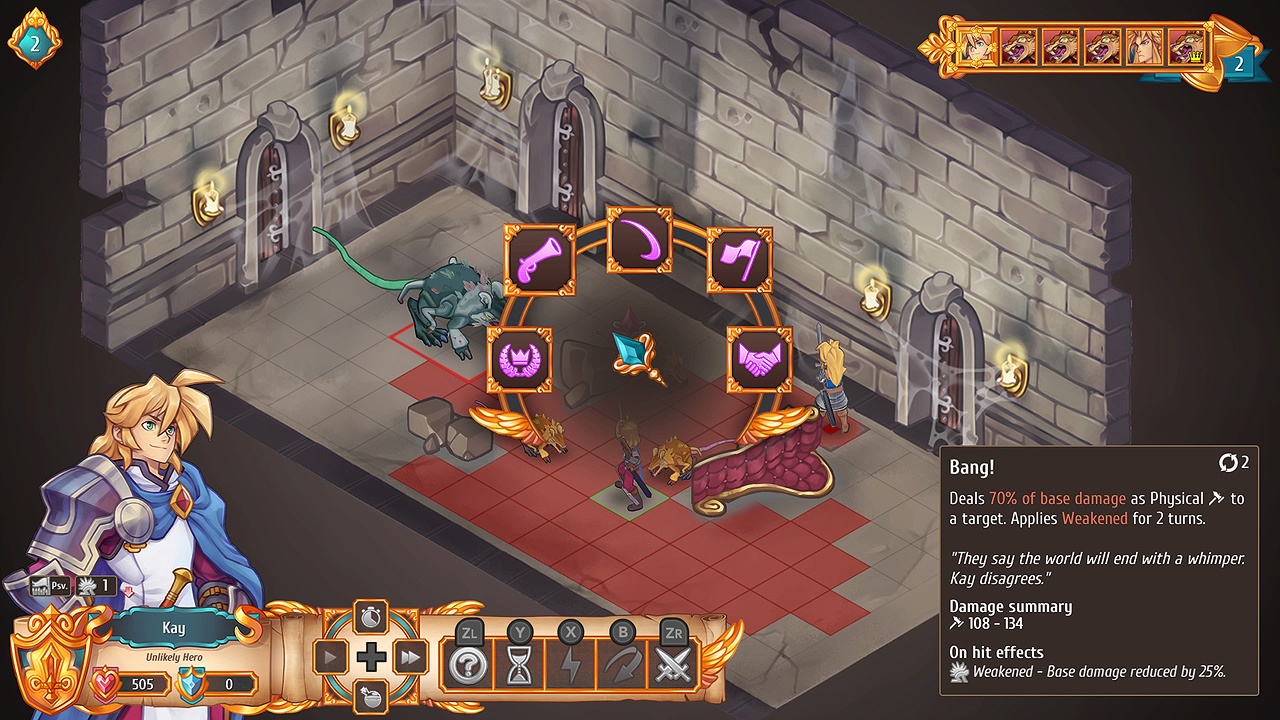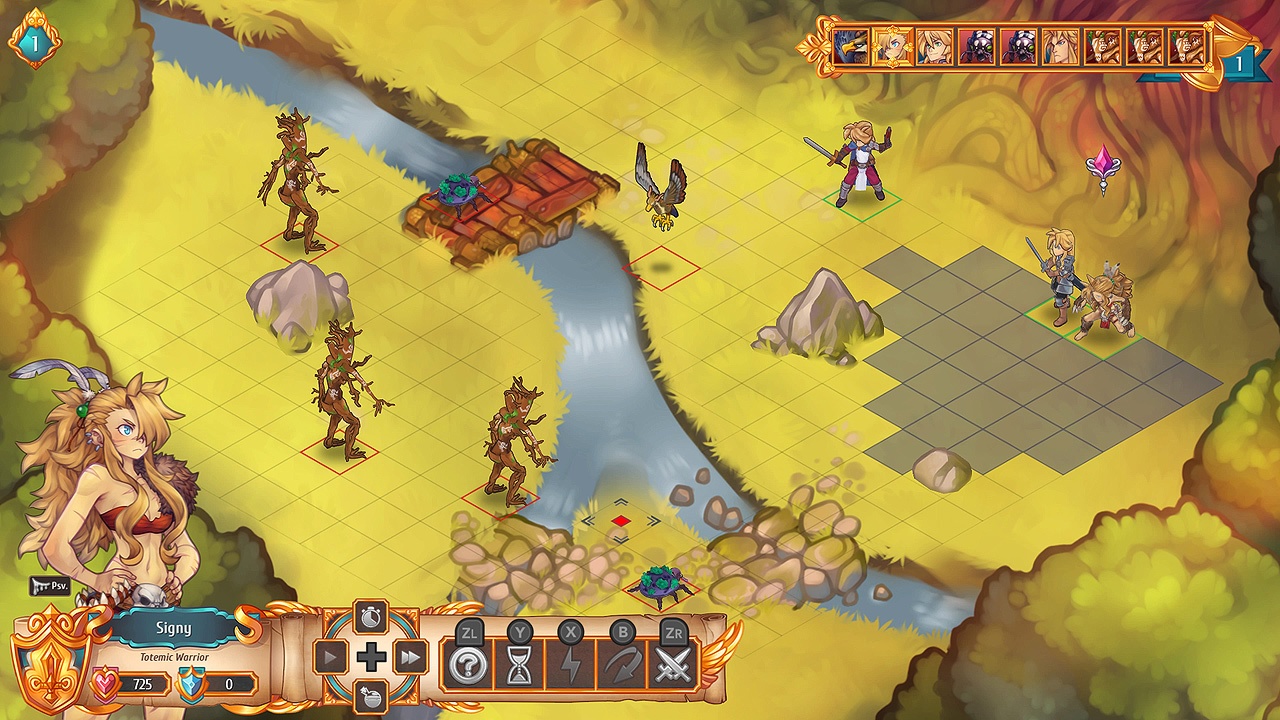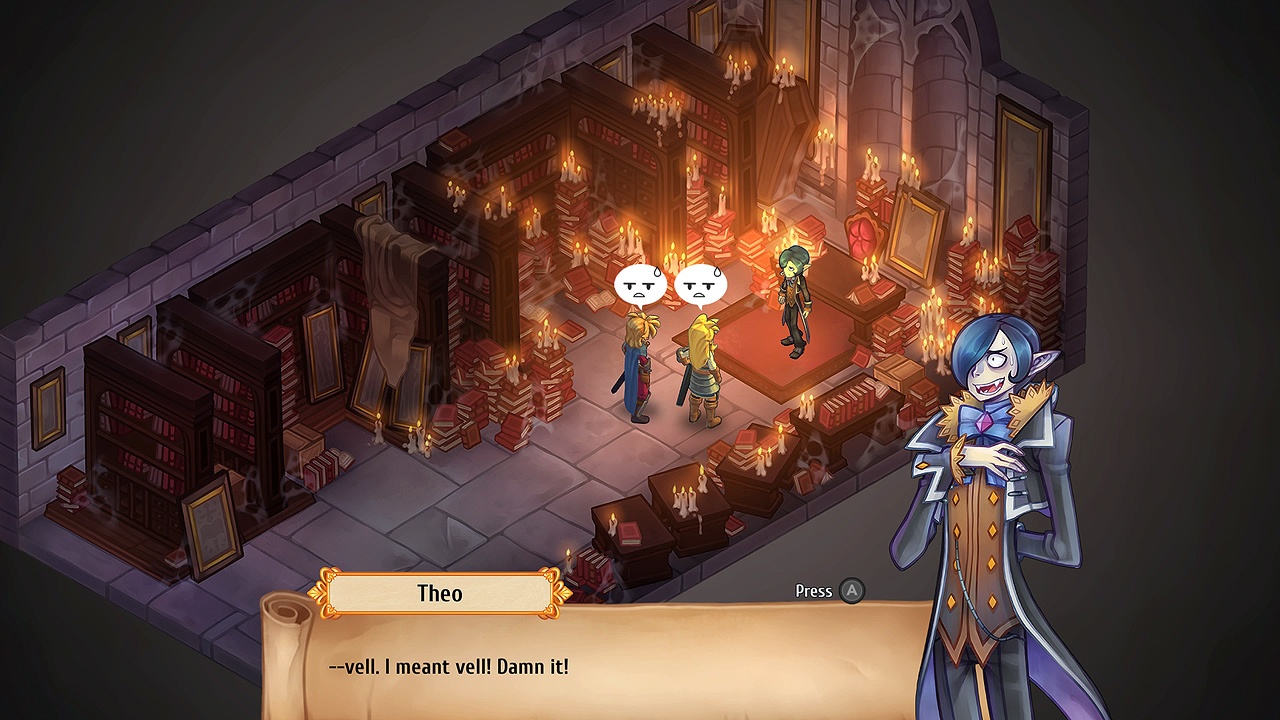
I played Regalia of Men and Monarchs a little while back on PC and I’m very happy to see it’s made its way to console. This charming strategy RPG is a breath of fresh air when compared to your cliched world saving plot line, managing to deliver humour at every given chance without detracting from the plot. Developed by Pixelated Milk, It was released on PS4, Switch, and Xbox One on April 12th, 2018 as a Royal Edition, which comes bundled with the Unending Grimoire DLC that introduces an additional character and building to add to your growing kingdom as well as a new activity: the Grimoire, which allows you to take on challenging, randomized battles in exchange for customized appearances for your party.
From the get-go, Regalia establishes its strong narrative voice and superb voice acting with a series of cutscenes detailing the events leading up to Kay, your protagonist and unlikely lord of Ascalia, being indebted to a sketchy man and his monstrous associates. For those who like to skip cutscenes and just get to the strategic battles, this isn’t the game for you because to do so would cut out a lot of what makes this game great. For one thing, the dialogue is hilarious. Characters are extra expressive via speech bubbles which show Japanese emoticon style expressions for added effect.
Presentation-wise, the game is gorgeous. Hand-drawn backgrounds are a treat to behold and the character design is top notch. The music isn’t anything to write home about, but it does a servicable job. I was impressed by the voice acting, like I mentioned, though I wasn’t a huge fan of the fact that there’s a load screen between virtually every scene change, during which you’re prompted to press x to proceed. It slowed down game flow.
The game can be played in three difficulties, the easiest of which allows you to focus on the story and skip combat if you so choose to. Normal difficulty is slated as “the way the game is intended to be played,” with combat entirely intact, and for those looking for a real challenge there’s Nightmare difficulty. It’s worth noting that even on easy difficulty, combat is pretty difficult as the game doesn’t pull any punches. Your difficulty setting also effects how taxing the objectives needed to successfully complete chapters will be, so keep that in mind before you make your selection.

In order to progress successfully through all sick chapters, you must complete a set number of kingdom quests within a time limit. For anyone familiar with the Atelier series, you’ll be right at home with this setup. Kingdom quests are actually tasks you should be able to fulfill through normal play such as crafting a certain amount of items, increasing your bonds to a specific point, and clearing dungeons. They do cause you to play a bit more conscientiously, but for the most part they simply guide you forward and keep the game moving. You can complete any kingdom quest you see fit, so pending how much time your chosen tasks will take versus how much time is available to you, you could easily spend an entire chapter just increasing bonds and fishing versus a chapter spent fighting your way through dungeons and building facilities.
On the management side of things, you’re able to use components you gain after battle (or later, via purchase) to contract and upgrade facilities. As your town grows in population, characters will require their own place in order for you to be able to take advantage of their skills; i.e a smithy for a blacksmith and so on. Building, like everything else, passes time. As a Lord, you’ll also be expected to engage in Diplomatic Missives, during which you make decisions regarding neighboring kingdoms that will effect your reputation with them. These are a less engaging part of the game as they consist of walls of text and are entirely optional.
Combat is turn based strategy on a grid during which the characters with the greatest initiative state move first. You can deploy up to four characters from a party of six, though the full roster consists of 12 different characters with a variety of skills. It’s worth noting that characters are significantly different as far as play style and there are advantages and disadvantages of using different units. On your characters’ turns, you’re able to move them and attack enemies within range. Each character has five skills, four of which can be used for no cost and have a set number of turns cooldown and a single special attack that uses Command Points.
There are a few ways Regalia stands apart from other SRPGs, but the most interesting and challenging aspect of combat is the fact the fact that there’s no way of healing at all during a fight. Instead, skills provide shields, which will deplete before the health bar is affected. The Command Points I mentioned are used for special attacks as well as to give your character a second chance to attack. Proper use of Command Points can seriously turn the tide of combat and allows for greater strategic planning.
Line of sight is vitally important in Regalia, meaning that if there’s an obstacle between yourself and your target, you won’t be able to attack. This is realistic, but can also cripple your combat effectiveness if you’re not careful. Thos is made doubly true by the fact that you can’t move past other units–not even allies. Friendly fire is also a thing and these three aspects combine to make positioning key. Fortunately, you’re able to undo any move using the circle button just as long as you haven’t attacked as of yet.
Combat challenges are laid out at beginning of encounter and can range from tasks as simple as having all characters alive at the end of a battle to complex tasks like only using one character to strike every killing blow. Attempting to fulfill every single challenge can make battles nigh impossible as the randomly assigned tasks can sometimes synergize in ways that require you to change up your play style entirely and take risks. If you’re the masochistic completionist type, you can restart battle at any time using the touch pad. Completing challenges grant bonus exp and increase odds of loot dropping.
Another thing I liked about combat in Regalia is the party based level rather than individual level. I’m the kind of gamer who would catch or breed Pokemon and train them up to the same level as monsters that had been in my team since much earlier in the game and the party based level system makes it so that everyone is on the same page no matter how late in the game they join your cause.

When you aren’t managing your kingdom, you’ll take a party of six into the dungeons. Dungeons take a specified number of days to travel to as well as to complete and will eat up your remaining days much more quickly than building and upgrading facilities. Dungeons consist of a network of nodes. Nodes allows you to choose your route, though you’ll need to defeat an adjacent node in order to proceed to the next one, and denote what you’ll encounter such as combat, story events, and other points of interest.
Text Adventures. These choose your own adventures are shown in the form of a story book. During text adventures, you’ll read and choose how you’d like your character to proceed. These can lead to finding rare treasure and may even shift your character’s opinions towards you, so choose wisely.
Camps. Camps allow you to save mid dungeon. You’re also able to revive fallen allies, though this can only be done once per dungeon. You don’t have to use the revival function when you first visit a camp, so save it for an emergency.
Completing dungeons introduces new characters to town and also moves the story along. Characters will hang around town and you can visit locations in order to spend time with them and increase their respect for you. These are comparable to the Social Link like in Persona in that during special events, selecting the correct dialogue option more effectively increases RP. Deepening friendships actually develops characters that can be used in combat by introducing modifiers to their attacks and unlocking additional skills. Befriending non-combat characters enables the use of new facilities as well as increases passive stats like combat drops and fishing bonuses. In short, it’s in your best interest to make friends.
The balance between managing your kingdom and progressing in the story is a tense affair given that you can potentially fail and get a game over. Poor management and save game practices can lead to you locking yourself into a bad ending, so that’s something to keep in mind every time you make a decision. For those who aren’t used to this set up, which is comparable to the Atelier series, it can be a stressful and slightly overwhelming situation, but for those who know how to work the system, management in Regalia is like a game of chess, where you carefully plan out your moves ahead of time.
. Bottom Line.
Regalia dares to do something different and it brings something new to the RPG table by blending genres. It’s definitely worth a play if you’re a strategy or management simulation fan and even if you’re just invested in a good story, the game has you covered. It’s not without it’s flaws, what with itss frequent load screens, and the threat of game over after having spent so many hours building your kingdom may deter some, but the struggle is well worth it.

REVIEW CODE: A complimentary Sony Playstation 4 code was provided to Bonus Stage for this review. Please send all review code enquiries to press@4gn.co.uk.
Subscribe to our mailing list
Get the latest game reviews, news, features, and more straight to your inbox
Thank you for subscribing to Bonus Stage.
Something went wrong.
-
Gameplay - /10
0/10
-
Graphics - /10
0/10
-
Sound - /10
0/10
-
Replay Value - /10
0/10
User Review
( votes)
Comments Rating
0
(0 reviews)





